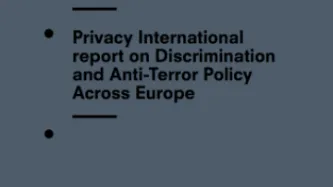Advanced Search
Content Type: Report
Race relations across European states are usually far from ideal. However in law, European countries appear to grant Europeans ideal protections against discrimination. There are mounting tensions with ethnic and minority communities in countless European countries, with particular suspicion and aggression pointed towards the Roma people, Travellers, Northern Africans, Turks, Jehovah’s Witnesses, and people of Islamic and other faiths. Increasingly these groups are finding safe havens behind…
Content Type: Press release
The London-based human rights watchdog Privacy International today attacked Justice Minister Donner's campaign on 'Wet op de uitgebreide identificatieplicht' as an "underhanded" attempt to convince innocent citizens to forego their legal rights.
Last year the organisation advised that the identity legislation would violate both the European Convention on Human Rights and the UN Declaration on the Rights of the Child.
Privacy International today warned that the identity campaign indicated that…
Content Type: Press release
The global watchdog Privacy International has today simultaneously filed complaints against Google's controversial Gmail service with privacy regulators in sixteen countries.
The move creates Google's biggest challenge yet in the short but turbulent public debate over its new email service.
Complaints have been filed with the privacy and data protection regulators of France, Germany, the Netherlands, Greece, Italy, Spain, Czech Republic, Belgium, Denmark, Sweden, Ireland, Portugal, Poland,…
Content Type: Press release
A conference held today at the London School of Economics will hear new statistics showing that UK law enforcement and investigation agencies are demanding an unprecedented quantity of customer records from communications providers.
Privacy International has compiled figures based on estimates supplied by the Home Office, Ministerial statements, legal experts, the communications industry and the All Party Internet Group of MPs. The figures being released today indicate that police and…
Content Type: Press release
The global human rights watchdog Privacy International (PI) has warned that tens of thousands of UK school children are being finger printed by schools, often without the knowledge or consent of their parents.
The electronic finger printing is being conducted as part of a cost cutting "automation" of school libraries. Privacy International has condemned the procedure, branding it "dangerous, illegal and unnecessary", and has called for a prohibition of the technology in schools.
As many as…
